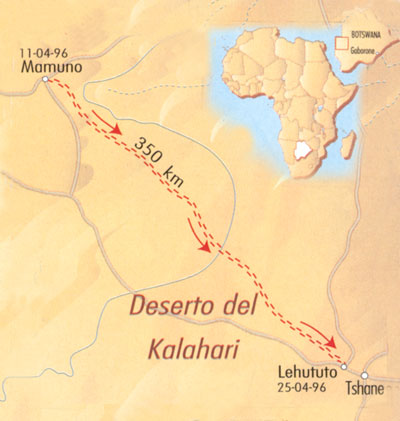Deserto del Kalahari
Period: April 1996
The Kalahari
desert is twice as big as Italy, spread between Namibia and
Botswana in the austral hemisphere on the south of Africa. This
desert is the home of the Bushmen who are the only population
able to survive in one of the driest regions of the earth. Thanks
to a very short rain season it a bush desert, populated by numerous
animals: from venomous insects, deadly snakes, gazelles, ostrich,
lions and hyenas. Every encounter is possible and may become
dangerous.
Carla decided
to try crossing on foot and alone: The purpose of it was to
prove that a person who was not born in the desert could adapt
and live like the populations there.
She was
accepted by a small Bushmen community, which in a few days period,
taught her the basic knowledge of the surviving in extreme conditions.
It was an experience that changed her life and that left a strong
trace in her explorer's soul.
"Take
from the Kalahari only what you need to live. Respect every
animal that you will encounter and you will see that you will
be respected back…. It will be a very hard challenge but
the Bushmen will always guide you with their thoughts and will
help you. The Kalahari is not your enemy: accept it for what
it is".
On April
the 11th she left the small Bushmen's village with the hunter
and bushman Kase, and began the crossing from a small town by
Charles Hill in Botswana called Mamuno only with a backpack
weighting 18 kilos. She only carried seven litters of water
and a hand full of dry gazelle meat, called biltong, which is
used by the Bushmen during their hunting trips. For the entire
duration of the challenge she had to feed only on what she found
in the desert, without using any kind of energy food. It was
the duty of Kase, her walking partner, to show her what is edible
and where to find the water.

In her back pack she carried: tent and sleeping bag, a first aid
kit which include a manual venom pump, a radio, GPS, night vision,
a photo camera and a small video camera. She walked in the southeast
direction for 350 kilometers in 15 days feeding only on berries,
nuts and resin. The radio contact with the base camp, which was
guided as always by her husband, which was situated several miles
away, with two off road vehicles, was interrupted after 10 days
because of low radio battery.The temperature went from 40 degrees
in the day to 5 degrees at night. Every night Carla found shelter
in the ultra light tent built especially for the challenge, while
Kase slept cuddled up by the fire they kept lit all night to keep
animals away.
Walking
in the day was exhausting: they marched between bushes covered
with thorns and tall dry grass that hide all sort of danger,
especially snakes and scorpions that make their homes in the
grass.
The climate was more humid in respect to the other deserts and
Carla was constantly wet with sweat that covered her skin. During
the hottest hours they were forced to stop and find shelter
under some spiny acacia trees in order not to lose too much
fluid.
The water
supply was almost empty and the thirst drama began. Even the
ostrich egg shells that Kase used as water containers were empty
and there was no sign of water.
…"I
was able to control hunger, fatigue and pain, but I can't find
the way to control Thirst…. My tongue became thick and
swelled, it seamed I had sand paper in my mouth and I tried
to make some drop of saliva but it was useless." I keep
telling myself out loud that the real champion is the one who
knows how to lose and decided that if we wouldn't find water
the next morning I would quit".
Almost as
a miracle, the next day they arrived in a small village where
they could refill their water supply. For Carla this was the
signal that the desert is not her enemy but wants to help her
to continue, just as the Bushmen told her. They also didn't
have any problems with the animals:"respect them and you
will be respected".
Two days
from the end of the challenge, Kase left her and went back to
his village: They were going out of the bushmen's territory
and Kase, who is shy and reserved, didn't want to be around
foreign territory. She went alone and without the radio contact.
On April
25, Carla arrived in Lehututu the place that was establish for
her encounter with the support team and the challenge ended…She
was exhausted and had lost five kilos, but she successfully
completed her challenge. Her husband Oscar gave her a water
canteen and while she was drinking it poured the water all over
her face and on the Tuareg turban: The nightmare of the thirst
was over.

